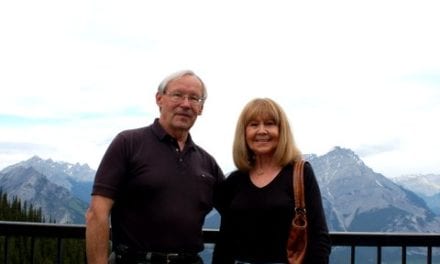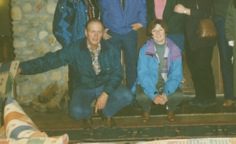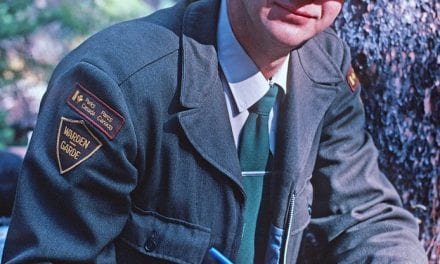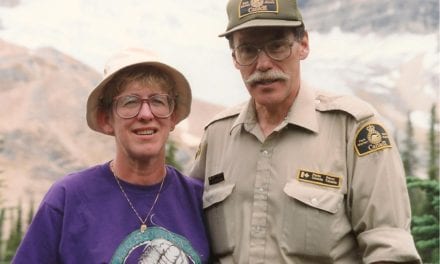Ken: And then there was J.W., also known as Bear Man Campbell. Oh God, he scared the hell out of Bev (Bennett) one night. He game down about 11 o‘clock one night….and he knocked on Steve and Bev’s door and….like he’d have about 35 layers of clothes on….and his hair stuck out….and he looked like the “Mad Trapper Of Rat River. He knocked on the door and Bev answered it and she just started screaming and Steve had to come running and save her from Bear Man Campbell. (laughs)
Deb: Yeah, he’d show up at six o’clock at night, in the middle of the winter. It would be dark and cold and he’d knock on the door. I’d ask, “Have you eaten Jim?” “Nope” “Well then, come in and have some supper”. He was quite content to come in and sit down for a meal. He was quite the character.
Perry: I was at Scotch Camp one night. About dark he and his blond wife….I forget her name now….they rode in and they had everything tied on the back of the horses….sleeping bags and everything….they didn’t have a packhorse with them. J.W. said, “Don’t worry boys I left the rifles at the boundary.” I thought, Yeah, I’ll bet! Anyways, he said that they were going out of the park that night.
Deb: He liked to travel at night. And half of his pack string would be a bunch of wildies (wild horses)…. I don’t know how he got by with it half the time.
Ken: We were down there watching him pack up one time. When Cal was here the thing to do was to ride the colts through the campground, all summer long, and also to see who was in the campground. It was kind of a patrol. But it was also good for the colts because there would be doors opening and all kinds of shit happening – actually all that activity was good for the colts. So, we rode through there one day….it’s about 4 in the afternoon….and there was Bear Man packing up to go to the Clearwater. They’ve got feet tied up and they’re trying to get packs on; and they got horses three-way hobbled….and they get them all packed up. There was about six of them and when they went across the bridge, the one in the middle was lying on its belly and they were dragging him. They got up there somehow. The next day, I saw his hired man that was with Campbell. He had come back to the campground. I said, “How did you guys make out last night?” And he said, “The only way that we could have had more trouble was to have had more horses!”
Rod: You must see some awful sights at that campground. I know a few times I have been up there you see some awful scary stuff. There are also some competent people that come up there.
Ken: I used to tell the guys “When you ride through the campground watch what you say because the guy in the rubber boots and the ball cap, he might know a lot more than you think.
Deb: Some of them come from a big horse operation somewhere and are very knowledgeable and the one that looks like a cowboy is the weekend warrior and has wrecks.
Ken: Some of them get these half broke horses and bring them out to the Ya Ha Tinda. The Dad would climb up on this horse and you wonder why the horse hadn’t bucked him off yet. And then the Mom would hand him a kid and he’d put it in front of him and this horse is wired for sound and you’d think, Oh my God! I can’t watch this! There was lots of that happening.
Deb: We always say that it is a good thing that horses are forgiving.
Perry: Well that’s a very good point. In all those years we only had one warden killed although there was a lot of near misses. But when you think about it that was quite a wreck. The Ya Ha Tinda (in those days) was turning out those kind of horses. And later on, when you guys came, the horses were trained. That was one of the reasons that the quarter horses were bought, it kind of put that quieter (type of horse) and it worked out. When Neil was killed that was part of the reason we started buying horses (for the brood string). It was a real compliment to the YHT that few serious accidents happened with Ya Ha Tinda trained horses
Deb: There was a shift in the type of people that were being hired. They were educated at a different level but didn’t have backcountry or agricultural experience ….
Rod: It says a lot for the ability to train a horse for relatively green riders to be able to take them out for weeks at a time.
Ken: We’d start them as two-year olds and send them out as three-year olds (to the parks). We always tried to talk Cal into letting us ride them for two years and then turn them over as four-year olds. Cal had no intention of that happening.
Ken: Cal would not buy into that. Mind you it took us almost a year into talking Cal into changing the shifts.
Deb: When we first got there you worked five days and had two off…..as if you were in a town. Well, it’s a little bit more of a trek, and you’ve got a family and your packing up and getting out of there. Really, you don’t even have a full day off because you’re driving somewhere. So Cal said, “Okay Debos, make out a calendar and I will look at it.” He always called me ‘Debos’. So I made out a calendar and made it work. I left him with five days a week so he could still go home every weekend but the other two guys could rotate ten and four. He relented and said “okay”. That worked a lot better for all of us, and Cal was happy because he had his five and two (shift). But you had to lay it out and put it in black and white for him.
Rod: So tell us about Steve Bennett.
Ken: Steve was there for four years. He was a good worker and easy to get along with.
Rod: Where did he come from?
Ken: I worked with him at Warner’s in Banff. He was originally born in Penticton, I believe. He was horse shoeing in B.C., and then he came over and worked for Ron (Warner) and then came to the Ya Ha Tinda.
Deb: We had known Steve and Bev in Banff when we all worked together.
Rod: There seems to be lots of connections there.
Ken: Another Cal story. Steve was riding one of the colts (Yankee) and he had only been there for about three weeks and of course, Cal was all set up in his house watching with binoculars. Cal saw that Steve was down on the flat below the old round corral …and he was walking around leading his horse in circles. So Cal called us and says, “You got to go get that Bennett. He’s goofy in the head.” I said, “What do you mean he’s goofy in the head?” Cal says, “He’s goofy in the head! He’s just walking around leading his horse.” So I go down there and the horn cap is torn right off his saddle, there’s no rope, there’s nothing. He’d been in a wreck and his head was all dinged up. His colt must have bolted and run into a tree.
Deb: So that was Cal’s way of telling you that he (Steve) needed help. He said he (Steve) was goofy in the head. (Jokingly) Deb says “Gee, we’ll get right on that”.
Ken: We ended up taking Steve to the hospital and they kept him overnight because he had a concussion.
To this day, he does not remember what happened.
Deb: The best we can come up with is that his colt bolted through the trees and the saddle must have loosened off and tipped to the side and then he probably got wacked on a tree. His saddle horn was torn off, and it had pulled his rope totally taught and ripped the rope string right out of the saddle. So that must have been what happened but he has never remembered to this day.
Ken: Cal did not have a lot of sympathy.
Deb: If it was a little kid or an old dog, yes, he had sympathy….but not with adults. Yes, so we worked together for four years…. Steve was a good horseshoer and he got on well with the colts. He is easy going.
Ken: And he was good when we started giving the warden (horsemanship) courses…. he was a good teacher.
Deb: He is still shoeing today and he lives out at Mossleigh as a fulltime farrier.
Rod: What about Peter Campbell? Was he there when you were there?
Ken: No.
Perry: He had to be replaced.
Rod: Cal fired him right?
Ken: I don’t know the circumstances on what happened in this case.
Perry: So when you took over, you had Neil and who else.
Ken: Neil had already left the ranch when I took over and I worked with Frank Staples, Greg Neilson and Todd McCready.
Perry: Todd got hurt.
Ken: Yes, that was on Foxy. She blew up and tore his pelvis apart. He rode her and then we went for a two-hour ride but he couldn’t get off her. We didn’t realize he had torn his pelvis.
Deb: But Alfie (Creighton) worked there also.
Ken: Yes, Alfie took over from Peter, and then I took over from Alfie.
Deb: Ken and I’d worked with Alfie up at Maligne Lake, because we are all from Jasper. I drove tour boats up there and Ken did some warden patrol work.
Ken: Ian Syme, Frank Staples, Alfie and myself all worked at Maligne Lake before our other seasonal jobs began.
Rod: So, when you left the ranch the first time where did you go from there?
Ken: We went to Enderby, B.C. I went to run an R.V. campground and marina for Steve Logan on Okanagan lake….
Rod: How long did you stay there?
Ken: I stayed there four months and then I went back to the ranch. They gave me a three-month leave of absence and let me go back….because it (the job at Enderby) wasn’t fitting for me.
Rod: When you went back to the ranch, were you the Manager?
Ken: No. Cal was still there and then he retired. I took over as the Ranch Manager and Cal moved to town.
Rod: Tell us about that. Was that a little different….in having more responsibility?
Ken: Not really. Basically, it was already set up. We did make some improvements that Cal would not have let us do. The horse programs pretty much stayed the same as I really liked the program. I liked the fact that we tied the babies in every night and I thought that really helped the colts become quieter. I remember one time we had a bunch of British army boys there and they were doing a wolf study for Banff. They were on a survival program and they got 2 kg of rice and simulated bacon bits and spices and they had to go out and camp overnight in the middle of the winter. These guys had been in the Falkland Islands; they could parachute from 400 feet out of planes but when they came down to help us tie the colts in the barn, they said that was the scariest thing they’d ever done! (laughs)
Deb: They were just like kids….the colts would come in and they were a bit wired and excited. We told these guys, “You are going to have to calm down; you are scaring these babies”.
Ken: Cal would never let anybody else help. But I thought the more people that were involved, the better the horses got because they got used to different things happening.
Deb: Just more exposure to people doing things that you don’t expect.
Ken: And then we set up an obstacle course for the horses and we had it so that the horses had to walk across tarps and a teeter-totter. I don’t know if you remember that little yellow trailer at the Ya Ha Tinda but it had the green windows on the front. It was the scariest thing for horses. We parked that down there and everybody had to load their horse into this spooky green trailer. This made the horses quieter. We kind of followed the R.C.M.P. crowd control horse training. I felt if we could get them to do this stuff then they would be a lot quieter when they were being ridden. And actually, it was a nice change for us as you weren’t just out leading a packhorse on the trails….you were actually exposing them to a variety of different experiences.
Perry: I rode Rex in the Calgary Stampede Parade when he was three, the first year he was off the ranch. Of course, when you put those horses in a position like that they trust you because they got nowhere to go. We got away with it.
Deb: Yes, sometimes you just sneak a ride, depending on what you are doing.
Ken: The only one that really got Cal was Frank Burstom….he nailed Cal, and it was so funny. We went out at 6 am every morning to feed the horses. You had to be at Cal’s every morning at 7:30 for coffee and we’d find out what the day was going to be all about. Cal never went down to the barn in the morning; it was either Steve or me or whoever was working. So we went down (to the barn) and Frank’s horses were in the yard. Do you think we could catch that pair of bastards…finally we ran them into the bottom pens and up through the barn to catch them. At about 8 o’clock in the morning Frank starts staggering up the hill towards Cal’s…. and he gets in and he sits down and Cal pours him a coffee. Of course Cal is point blank and says, “What the hell is wrong with your horses there Burstrom? Jesus Christ, you can’t catch them pair of bastards!” And Burstrom says, “Well, what time did you try to catch them Cal?” Cal says, “six in the morning.” Burstrom says, “There’s your problem Cal. My horses don’t get up that early!” Cal just looked at him. I just had to laugh at that one.
Rod: So they allowed you to do what you wanted to do to improve the program.
Ken: Yes. Perry was one of my supervisors and trusted our decisions.
Rod: What about interference from Regional Office or even higher like Ottawa?
Ken: No. But twice we while we were there, we went through discussions with the Rocky Mountain Elk Foundation over the ranch. At one time the ranch was going to be moved here to the OH in a land swap. (The Rocky Mountain Elk Foundation (RMEF) is a conservation organization, founded in the United States in 1984 by four hunters from Troy, Montana (Bob Munson, Bill Munson, Dan Bull and Charlie Decker). Its mission is to ensure the future of elk, other wildlife, their habitat and our hunting heritage. The Rocky Mountain Elk Foundation believes that Hunting Is Conservation. (Wikipedia).
Deb: Isn’t that ironic that we are here now (at the OH Ranch).
Perry: And the Bar U came into it at one time as well.
Ken: I had to go down to the Bar U and meet with Sylvia, the Superintendent (of the Bar U) because they wanted to have the stud and the brood mares at the Bar U. The place was new to Parks Canada and it needed some TLC before livestock could be turned out. I told them that horses couldn’t be there as they’d be cut all to rat shit. So we never did end up taking horses to the Bar U. Mind you, (later) Arrow did get retired to the Bar U.
Deb: Arrow came to the Bar U because they were getting rid of the breeding program. Rick Smith phoned us and asked us if we wanted the stud. Of course, we were kind of attached to him as the kids grew up around him and so we said, “Okay, bring Arrow.” So we had him there until he was 24 years old.
Perry: I would like to add a little bit….in 1990s, when the ranch came over to the Warden Service….I was given that portfolio. The region hadn’t put any money into the ranch. The chief wardens realized that and started to put resources into the Ya Ha Tinda like they should have.
Ken: We then had the resources to paint the buildings and improve the infrastructure.
Perry: And I don’t think that you got paid Deb at first did you?
Deb: Not at first. Later, I did get paid for about 20 hours a week. When we got there, Cal had all the records on little recipe cards and I think Moe Vroom had done these (cards) for years. I asked Cal if he wanted to have the records updated and put on a computer. He fought it for a while but came around to my way of thinking.



